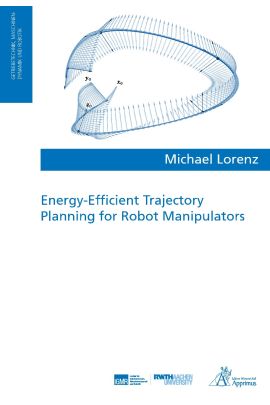Characterized by the growing awareness of anthropogenic global warming and its disastrous effects on the Earth’s climate system, society is establishing an increasing demand for effective environment and climate protection. Since human energy requirements represent a significant contribution to global warming, the industrial sector gradually focuses on the sustainable utilization of available raw materials and energy resources. In this respect, manufacturing industries provide considerable potential for improving the energy efficiency of future product development and production processes.
Against this background, the present thesis introduces an innovative methodology for the efficient design and optimization of technical motion profiles performed by automatic machines and robots. In order to ensure an ecological organisation of future manufacturing processes, the proposed approach represents an extension of discrete optimal planning towards universal manipulation and transportation tasks as well as arbitrarily complex robot systems. Conceptually based on graph theory, different methods of quasi-random state space sampling and shortest path exploration are analysed and tested for generalized motion patterns. To this end, the proposed concept involves a standard definition of spatial and temporal motion states as well as the heuristic cost evaluation of admissible state modifications. Subsequently, the directed set of discrete state transitions can systematically be searched for cost-efficient motion paths using suitable exploration algorithms.
For validation purposes, discrete optimal planning is compared to node-based trajectory optimization generally based on the analytical formulation and numerical optimization of elementary motion profiles. In addition, one central focus of this thesis is devoted to regenerative energy recuperation enabling supportive energy reductions through active drive management.
In summary, the methods developed within this thesis create the framework for energy-efficient motion design in multi-dimensional space. In contrast to classical planning strategies, discrete state space sampling ensures consistent shortest path exploration at significantly reduced runtime complexities. Assuming universal applicability of energy-efficient trajectory planning, the presented approach demonstrates high potential for the sustainable design of dynamic motion paths, finally supporting an ecological arrangement of general manufacturing processes.
| Autor | Lorenz, Michael |
|---|---|
| Gewicht | 0.283 kg |
| Erscheinungsdatum | 04.03.2021 |
Eigene Bewertung schreiben
Getriebetechnik, Maschinendynamik und Robotik
Energy-Efficient Trajectory Planning for Robot Manipulators
ISBN: 978-3-86359-947-8
Lieferzeit: 2-3 Tage
39,00 €
inkl. 7% MwSt.
Kurzbeschreibung
Anthropogenic global warming and its disastrous effects on the Earth’s climate system induce an increasing demand for sustainable product development and manufacturing processes. In this respect, motion design for automated machines and robots provides significant potential for improving the energy-efficiency of future production. This thesis addresses the problems related to trajectory optimization systematically developing and analysing innovative concepts for efficient robot motion design.
Auf Lager

